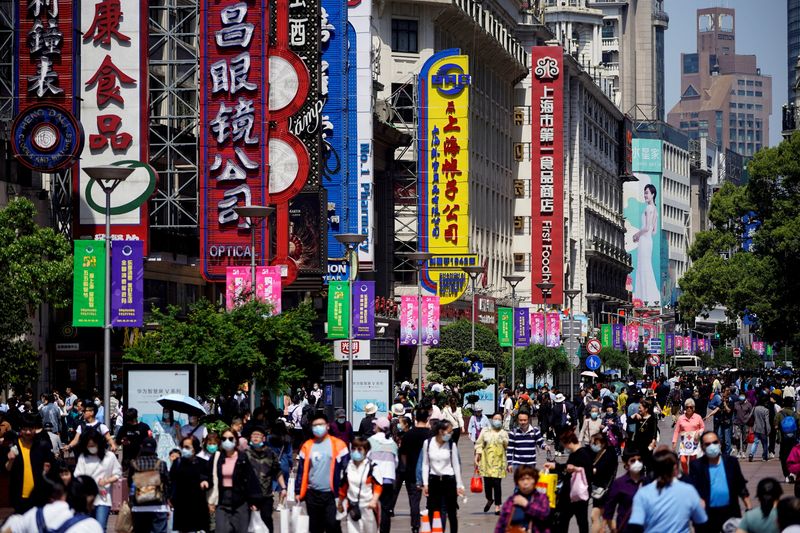By Kevin Yao
BEIJING (Reuters) - Chinese government advisers say they will recommend modest economic growth targets for next year ranging from 4.5% to 5.5% to an annual policymakers' meeting, marking a pickup from this year's growth but still hobbled by COVID-19 and other challenges.
China's leadership is also expected to prioritise stimulus over reform at the closed-door Central Economic Work Conference in December, which will chart the policy course for the world's second-largest economy, including economic targets, people involved in the government's policy discussions said.
The gathering will aim to jump-start growth that has been depressed by strict COVID 19-related curbs - and their disruption to supply chains and people's daily lives - as well as by a slumping property market and slowing global growth.
China's economy grew just 3% in the first three quarters of this year, well below the "around 5.5%" full-year target set by the government at last year's December work conference and the first shortfall since 2015, when China was hammered by a stock market crash and capital flight.
"We are not optimistic about the economic situation. Downward pressures are still there even as we make some policy adjustments on COVID and the property sector," said one of the government advisers, who all spoke on condition of anonymity because the deliberations are private.
"Fiscal policy will be proactive next year as we need to issue more debt to fund infrastructure projects. Monetary policy has room to ease given inflation remains moderate."
The government's recent easing of COVID curbs and stepped-up financial support for the property sector have boosted market sentiment regarding the economy, but it will take time for the effects to filter through to growth rates, policy sources and analysts said.
Four government advisers told Reuters they had drafted recommendations for next year's annual economic growth targets, ranging from 4.5% to 5.5%.
"We should set a growth target around 5% for next year," one of the advisers said.
Top leaders are expected to endorse a target at the December meeting, although it will not be announced publicly until China's annual parliament meeting, usually held in March.
A Reuters poll in October showed that economists expect China's economy to grow 3.2% in 2022 but some have since trimmed their forecasts. The poll also showed that China's growth could pick up to 5.0% in 2023.
COVID CONUNDRUM
President Xi Jinping laid out a long-term vision of "Chinese-style modernisation" at a twice-per-decade conference of the ruling Communist Party last month, with a goal of doubling China's economy by 2035 that would require annual growth of 4.7%, according to government economists.
To fulfil Xi's ambition of turning China into a great global power by the middle of the century, the country will have to avoid the "middle income trap" where economies can get stuck with low productivity and a mediocre spot in the global value chain.
China's economic slowdown and its ageing population have led many analysts to reconsider when China will surpass the United States as the world's largest economy - or if it ever will.
Chinese leaders, under pressure from the mounting economic costs of their strict COVID containment policy, announced a handful of easing measures, including shortening quarantines by two days and ending penalties for airlines that carry a large number of COVID-positive passengers.
But a full reopening is unlikely before the annual convening of China's parliament in March, the advisers said.
"We need to follow a step-by-step approach. We fear social instability if we abruptly remove all control measures," one of them said.
China faces a particularly pressing need to increase vaccine coverage among its elderly population before it can ease restrictions.

"If China were to abandon zero-COVID now, that would warrant a lower not higher GDP forecast for next year," Capital Economics wrote in a note.
In the troubled property sector as well, while the market reacted favourably to a rescue package on Sunday to boost liquidity for cash-strapped developers, including loan repayment extensions, analysts worry that weakening demand will make for a slow and bumpy recovery.